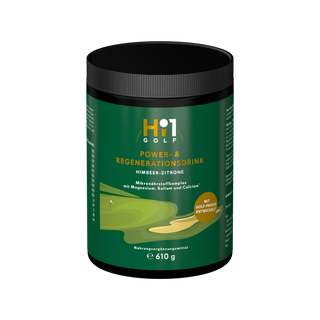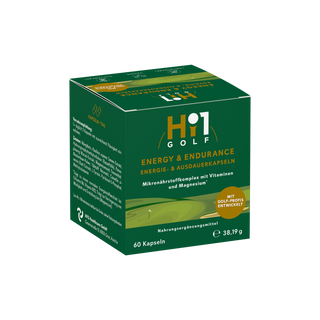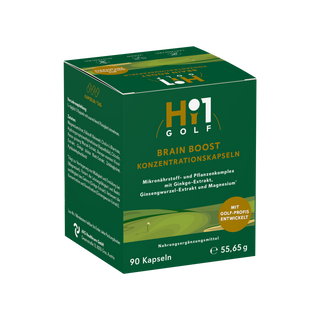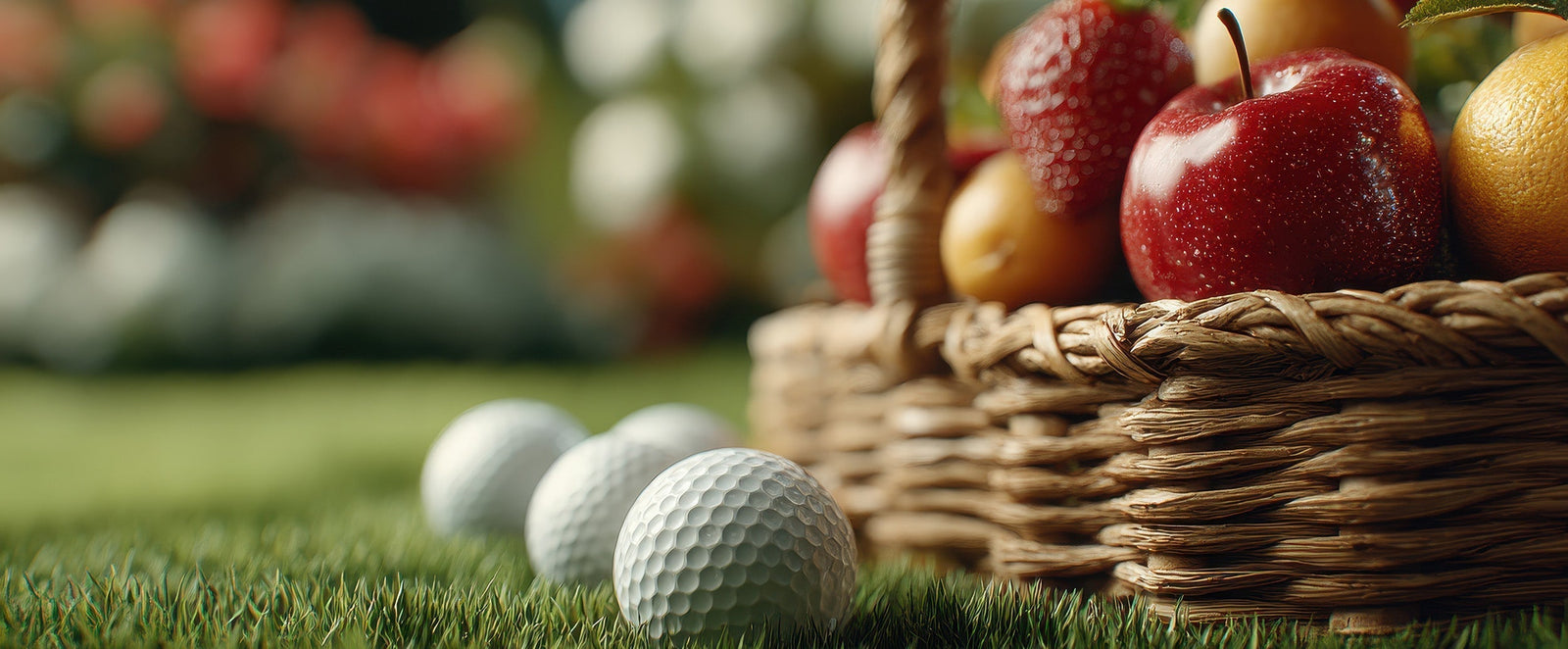Golfing in the heat: What the body really needs
A sunny day of golf can be a lot of fun . But in high temperatures, a run quickly becomes a physical and mental challenge. For several hours, the body is constantly in motion, while heat and sunlight have a direct impact on the organism. Through sweating, the body loses not only fluids but also important electrolytes, which are crucial for fluid balance, muscle and nerve function, and overall performance.
If these losses are not compensated, a loss of concentration, muscular fatigue and circulatory strain can occur . This is often precisely when maximum attention and coordination are required on the pitch. Remaining focused and stable under these conditions requires more than sun protection and a hat. What's crucial is supporting the body from within: adequate hydration, supplemented by a targeted supply of minerals and vitamins relevant for thermoregulation, muscle function, and cognitive performance.
A suitable electrolyte and vitamin-containing drink of the Hi1 brand can be used effectively here. It helps stabilize fluid balance, support neuromuscular function, and maintain mental alertness , even during intense sunlight and long gaming sessions.
Table of contents
- Why is golf particularly challenging in hot weather?
- What happens in your body when you play golf in hot weather?
- What warning signs indicate overheating or dehydration?
- How do you protect yourself from the heat while golfing?
- What nutrients does the body need in hot weather?
- What should you eat and drink in hot weather?
- How does dehydration affect concentration and play?
- What to do at the first signs of overload?
- Golfing in hot weather requires preparation and the right nutrients
Why is golf particularly challenging in hot weather?
Unlike other sports, golf doesn't have scheduled drinking breaks or refreshment stations. You have to decide for yourself when to drink something, take a break, or have a light snack. At the same time, the sport demands full concentration, precise movements, and mental presence. All of this becomes significantly more challenging in high temperatures.
Added to this is typical golf attire. Many players wear classic polo shirts, shorts, and caps, which may look stylish but are often less functional than specially designed sportswear. This can further complicate heat regulation. And while you're outside for hours, the sun often constantly blasts through your body. This leads to heavy sweating, increased fluid loss, and thus a strain on your circulatory system and muscles.
What happens in your body when you play golf in hot weather?
Even though golf doesn't involve traditional endurance exercises like sprints or interval runs, a full round in high temperatures places a significant strain on the body. The body is in motion for several hours, often in direct sunlight, over long distances, and under sustained pressure to concentrate. This requires both physical endurance and mental stability.
To regulate body temperature, the body increases sweating. However, this natural cooling mechanism also leads to the loss of important electrolytes, including magnesium, potassium, calcium, and sodium. These minerals play a key role in muscle activity, the transmission of impulses in the nervous system, and cognitive performance. If they are not adequately replaced over a prolonged period, the first signs of fatigue can appear. Typical symptoms include a decrease in concentration, reduced coordination, or muscular weakness, especially in the later stages of the round.
What warning signs indicate overheating or dehydration?
The body signals early on when heat stress or insufficient fluid intake is present. The first signs include a dry mouth, persistent thirst, difficulty concentrating, headaches, or a feeling of general exhaustion. Muscle cramps or circulatory problems may also occur. Another indicator is a significantly reduced urine output or a darker urine color.
Such symptoms should be taken seriously. Early interventions, such as regular drinking of small amounts, targeted electrolyte replenishment, and short recovery periods in the shade, can often effectively prevent overexertion. This helps maintain physical and mental performance even in high temperatures.
How do you protect yourself from the heat while golfing?
High temperatures pose a particular challenge on the golf course. Unlike many other sports, golfers spend several hours uninterrupted outdoors. There is often little shade, and the game requires constant movement and a high degree of concentration. Those who want to confidently handle these demands should ideally start the day before with proper preparation.
Maintaining a stable fluid balance doesn't just begin on the pitch. Drink plenty of water or a suitable sports drink the night before. A light, mineral-rich meal provides additional support. A good night's sleep also has a significant impact on physical endurance.
On match day itself, breathable, light-colored clothing and reliable sunscreen with a high SPF are helpful. A hat protects the most sensitive parts of the body from direct sunlight. Drink regularly and consciously during the round, ideally before you feel thirsty. Breaks in the shade or short rest periods during waiting periods are helpful for maintaining body temperature balance. Small snacks or a short recovery break about halfway through the round help maintain performance until the end.
What nutrients does the body need in hot weather?
The body uses sweating as a natural method of temperature regulation. This process involves the loss of not only water but also important minerals. Magnesium, potassium, and calcium are particularly affected. These electrolytes play a crucial role in muscle control, fluid distribution in the body, and mental performance.
B vitamins also play a key role. They support energy metabolism and help the body stay mentally alert and physically resilient. During prolonged exertion, zinc and iron are also helpful, as they stabilize oxygen transport and the immune system.
A well-balanced electrolyte-rich drink can provide these nutrients in a targeted manner. Consuming small amounts throughout the day is particularly effective. This keeps your circulation stable, your muscles performing well, and your concentration intact.
What should you eat and drink in hot weather?
Anyone playing in extreme heat should adjust their diet. Heavy or fatty foods put a strain on the circulatory system and can lead to exhaustion. Small, easily digestible snacks that provide quickly available energy while also providing important minerals are more suitable. Bananas, dried fruit, salty nuts, muesli bars, or rice cakes are particularly recommended.
Conscious consumption of beverages is also worthwhile. A combination of still water and an electrolyte-rich drink optimally supports fluid intake. Water with fresh lemon or cucumber can also help refresh you. Caffeine- or alcohol-containing beverages should be avoided before and during the round, as they place an additional strain on your hydration levels.
How does dehydration affect concentration and play?
Even a slight lack of water in the body can significantly reduce mental performance. Studies show that a water loss of just two percent can lead to slowed reactions, imprecise decision-making, and reduced concentration. These effects can noticeably impact the game, especially in the second half of the round, when physical exertion builds up.
With well-planned, regular fluid intake, combined with essential minerals, these effects can be significantly reduced. A consistent supply supports concentration and ensures a steady game until the last putt.
What to do at the first signs of overload?
When the body is overheated or dehydrated, it usually makes itself known clearly. The first warning signs can be dizziness, a dry mouth, general weakness, rapid heart rate, or restlessness. Anyone who notices these symptoms should act immediately.
Find a shady spot and sit or lie down. Calm, deep breathing helps stabilize your circulation. Take small sips of a mineral-rich drink. If possible, keep your legs slightly elevated. If your condition doesn't improve quickly, it's advisable to end the round. Physical stability always takes priority over athletic ambition. After all, a clear head and a resilient body are the best prerequisites for a safe and successful game.
Golfing in hot weather requires preparation and the right nutrients
High temperatures place special demands on the body. With careful preparation, the strain can be better balanced. Adequate fluid intake, the intake of important electrolytes, and light, mineral-rich meals support thermoregulation, maintain concentration, and help prevent muscular fatigue.
Taking these factors into account in advance creates favorable conditions for consistent physical and mental performance, even during longer rounds or in high outside temperatures. A stable supply of fluids and nutrients helps ensure controlled movement, clear decisions, and sustained play quality until the end.
This allows you to maintain a consistent level of play even in high temperatures – through forward-looking action and needs-based care before, during and after the round.








